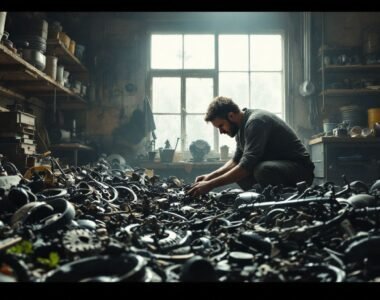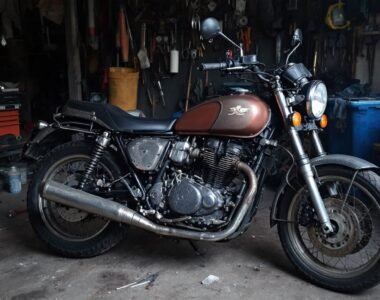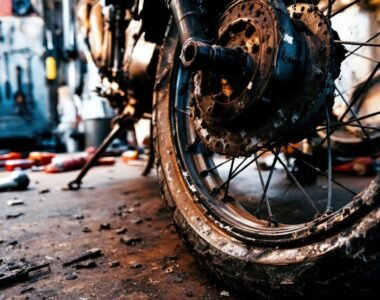
Have you ever had a bad bike crash? It can leave your motorcycle in a rough state. After the dust settles, you might wonder what to do with your wrecked bike. Many riders feel unsure about the steps after a motorcycle accident.
One key fact is that a helmet can save lives but needs replacing after a crash. This article will show you how to handle things after your motorcycle gets wrecked. You’ll learn about insurance, safety checks, and what “totaled” means for your bike.
Keep reading for smart tips on fixing or replacing your ride.
Key Takeaways
- After a motorcycle crash, always call the police and exchange details with others. This helps with insurance claims.
- Check if your motorbike is safe to ride. Look for damage and make sure brakes and lights work before you use it again.
- If your bike is totaled, meaning repairs cost more than its value, you can choose to keep it for parts or buy a new one. Insurance companies decide if a bike is totaled by looking at repair costs and the bike’s value.
- Wearing a damaged helmet is risky. Replace it right away to stay safe on the road.
- If you disagree with an insurance company’s offer after your bike is wrecked, consider getting help from an attorney who knows about motorcycle accidents.
The Immediate Aftermath of a Motorcycle Wreck
The moments after a motorcycle crash are crucial. You need to know what steps to take for your safety and legal needs.
Do I need to call the police?
After a motorcycle crash, calling the police is often necessary. They help create an official report of the incident. This document can be crucial for your insurance claim later on.
If someone is injured or if the damage looks severe, it’s best to get them involved right away.
Exchange details with any other parties involved in the wreck. Share your name, contact info, and insurance details. Also, gather information from others at the scene. Take photos of both motorcycles and any visible damage as well.
These records are helpful later during discussions with your insurance company.
You may feel an adrenaline rush after a crash, but avoid riding off immediately. Your bike might have hidden issues that need checking first before you hit the road again safely. Always inspect your gear too; replacing a damaged crash helmet could save you from further harm down the line.
What details do I exchange?
You need to exchange important information with anyone involved in the crash. Having these details will help you later with insurance and repairs.
- Personal Information: Share your name, address, and phone number. Get the same details from the other driver or rider.
- Insurance Details: Provide your motorcycle insurance company’s name and policy number. Ask for the other person’s insurance information too.
- Vehicle Information: Note down the make, model, and year of both motorcycles. This includes the license plate numbers as well.
- Witnesses: Collect names and contact information of any witnesses nearby. They can help if there is a dispute later on.
- Accident Details: Write down the time, date, and location of the crash. Take notes about what happened before, during, and after the accident.
- Photography: Take clear photos of all vehicles involved. Capture any visible damage to your motorcycle and others as well.
- Police Report: If police are called to the scene, ask for their report number. This report is important for insurance claims.
- Medical Information: If you or anyone else was injured, gather medical info too. Keep records of all injuries related to the crash.
This information will be crucial when dealing with your motorcycle insurance claim or settling any disputes later on. Next up is ensuring safety and legal compliance after a motorcycle wreck.
Can I ride my motorbike?
After sharing details with the other party, you may wonder if you can ride your motorbike. Check its condition first. Look for severe damage or any parts that do not work properly.
If your bike is safe to ride, then it is likely okay.
Always remember that riding a crashed motorcycle could be illegal if it isn’t roadworthy. If your crash helmet was damaged, replace it before riding again. Make sure you are also covered by insurance before hitting the road post-wreck.
Being cautious will help ensure your safety as well as legal compliance after the motorcycle crash aftermath.
Replacing the crash helmet
You cannot ride your motorbike until you take care of safety gear. A crash helmet is crucial for protecting your head. If yours got damaged, replace it right away. Helmets are designed to absorb impact during a fall or collision.
Check the helmet’s condition carefully after any accident. Look for cracks or dents. Even small damage can make the helmet unsafe. Always choose a new one that fits well and meets safety standards.
Your safety matters most when riding again, so invest in a quality helmet to keep safe on the road.
Ensuring Safety and Legal Compliance
3. Ensuring Safety and Legal Compliance: Check if your motorbike is safe to ride after a crash. You must also know the laws about riding damaged bikes. Your insurance can help with costs, so make sure to understand your policy.
Read on for more details on how to stay safe and follow the law!
Is the motorbike safe to ride?
After a motorcycle crash, the first step is to check if your bike is safe to ride. Look for visible damage. Check the frame, wheels, and handlebars. A bent frame or damaged wheels can make riding unsafe.
If something feels off or looks broken, do not ride it.
Next, inspect important parts like brakes and lights. Make sure they work properly before you think about getting back on. The cost of repairs may be high if parts are damaged badly.
Sometimes insurance companies declare a motorcycle a total loss when repair costs exceed its value.
If your gear got damaged in the accident, like the crash helmet or gloves, replace them before riding again. Proper protection keeps you safe on the road. Always perform a thorough motorcycle inspection after an incident to ensure safety and compliance with laws before considering whether to ride again or settle with your insurance company.
Is it legal to ride a crashed bike?
You must check if your bike is safe to ride after a crash. If it has serious damage, riding it may not be safe. Damage can affect the brakes and steering. Riding a badly damaged motorcycle could also lead to legal issues.
Laws about riding crashed bikes vary by state. Some places allow you to ride as long as the bike is roadworthy. Others require repairs or inspections first. Check your local laws before getting back on the road.
Always report any accidents to your insurance company. This helps with claims and ensures you stay compliant with legal requirements regarding total loss situations and settlement offers from insurance companies.
Insurance coverage and settling the claim
Insurance coverage is crucial after a motorcycle wreck. Your insurance company will assess the damage and determine if your bike is a total loss. This means it would cost more to fix than what it’s worth.
If they declare it totaled, you’ll receive a settlement offer based on its value.
Settling the claim can vary. Make sure you understand your options clearly. You might want to buy back the motorcycle from the insurer or keep parts for resale. Always check the vehicle history before making decisions about repairs or upgrades.
Now, let’s look at what happens next with handling a totaled motorcycle.
Handling a Totaled Motorcycle
A totaled motorcycle means it costs too much to fix compared to its value. You must understand how insurance companies decide this and what your options are next.
What does it mean when a motorcycle is totaled?
A motorcycle is considered totaled when the cost to repair it exceeds its value. Insurance companies declare a bike a “total loss” under these conditions. This means fixing the motorcycle will cost more than what it can be sold for in good condition.
Several factors determine if a motorcycle is totaled. These include the extent of damage and repair costs. For example, if crash repairs are too expensive compared to the bike’s worth, you’ll face this situation.
Once declared totaled, you might have options like selling parts or going to a salvage auction.
After being in an accident, assess your bike carefully. Look for any structural issues or major damages that could affect safety and performance. If unsure about its condition, consult with a mechanic who understands motorcycle damage well.
Always check insurance policies for coverage details before making decisions on your wrecked motorbike.
Factors and criteria used by insurance companies
Insurance companies have specific factors to decide if your motorcycle is a total loss. They look at the condition of your bike and the cost of repairs.
- Repair Costs: Companies calculate how much it will cost to fix your motorcycle. If repairs exceed its market value, they may declare it a total loss.
- Market Value: Insurers check the current market value of your motorcycle. They use guides and databases to find this amount.
- Age and Condition: The age of the bike matters. Older motorcycles usually lose value faster. Their pre-accident condition also affects the assessment.
- Damage Assessment: Adjusters inspect all damage done in the wreck. This includes frame damage, engine problems, and other crucial parts like wheels and brakes.
- Claims History: Your past claims can influence their decision. If you have many previous claims, they may hesitate on a new one.
- Salvage Value: Insurance companies consider how much they can sell your totaled motorcycle for parts or scrap metal after a loss claim is filed.
- Local Laws: State regulations often guide insurance decisions about total losses and salvage titles, which may affect what options you have next.
- Insurance Policy Terms: The details in your policy matter too. Coverage limits and specific terms can change how they process your claim.
Each factor plays a role in how insurers determine if a motorcycle becomes an insurance company total loss or not.
Evaluating the settlement offer
Evaluating the settlement offer is crucial after a motorcycle wreck. An insurance company declares a motorcycle a “total loss” when fixing it costs more than its value. You need to think about what they offer you.
Compare their amount to the cost of repairs and replacement parts. Check if your bike’s salvage value has been considered.
Consider keeping some parts for future use or resale if you decide not to take their offer. This could help cut costs on upgrades later. If you feel the settlement isn’t fair, explore options for dispute resolution with an attorney specialising in motorcycle accidents.
Disputes and hiring an attorney
Handling disputes can be tricky. You might feel the insurance offer is not fair. If you think your motorcycle was totaled but the payout seems low, hiring an attorney can help. They know how to deal with insurance companies and understand motorcycle salvage value better than most.
An attorney will check if you are getting a good settlement offer. They can explain your options clearly. It’s also wise to keep all documents related to your accident, including any title documents and repair quotes from before the crash.
Having these ready will strengthen your case.
Consider contacting a motorcycle accident attorney if negotiations stall or become complicated. A lawyer knows what it takes to fight for a better outcome when dealing with bike repairs or replacement costs after an accident.
With their help, you’ll ensure that you receive fair compensation for your loss while navigating the legal process confidently.
Options After a Totaled Motorcycle
You have many choices after your motorcycle is totaled. You can keep it for parts or buy it back from the insurance company. You might decide to get a new bike instead. Each choice has its own issues and challenges.
To learn more about these options, keep reading!
Keeping the totaled motorcycle
Keeping the totaled motorcycle can be an option for some riders. You might want to keep it for parts or repairs later. If you choose this route, check with your insurance. Some companies let you buy back your bike after they declare it a total loss.
A totaled motorcycle still holds value in parts. You may find that selling these parts is profitable if you’re handy with tools. Many DIY enthusiasts enjoy fixing their bikes over time and upgrading options can make the project fun.
Make sure to assess the damage carefully before deciding what to do next.
Buying back from the insurance company
If you choose to keep the totaled motorcycle, you can buy it back from the insurance company. This option lets you regain ownership of your bike after a wreck. Often, insurance companies will sell you the damaged bike for a lower price than its value before the crash.
You must consider the costs involved in repairing your motorcycle parts. Make sure to check if it’s worth fixing or just better to replace it with another bike. Buying back might be an option, but also weigh what other vehicles are available in case you want something different.
Replacing or purchasing a new motorcycle
You may want to think about replacing or purchasing a new motorcycle after a wreck. Your old bike might have taken serious damage, leaving it unsafe to ride. If the insurance company declares your bike a “total loss,” repairing it will likely cost more than its value.
This situation often leads riders to consider upgrade options for a new model.
Buying back your totaled motorcycle is also an option. Doing this allows you to repair and keep the bike yourself if you’re handy with tools. Motorcycle resale can be tricky, though, as potential buyers will worry about past damages.
Gather all repair details and maintenance records if you choose this route. Having that information helps build trust with buyers who seek peace of mind after learning about the accident history of your motorcycle.
Potential issues and disputes
After a wreck, issues with your motorcycle can arise. Parts may need repair or replacement. You might worry about what happens if it won’t start after being dropped. Check the battery and fluids first.
Damage can sometimes be hidden, so inspect carefully.
Disputes often come up with insurance companies. They might declare your motorbike a total loss if repairs cost more than its value. Understanding how they evaluate this is key for you as a DIY enthusiast.
An insurance settlement offer may not meet your expectations either, leading to conflicts over compensation.
If issues persist, hiring an attorney could help resolve disputes. They understand laws and can guide you through tricky situations after a crash. Their expertise can provide clarity on what steps to take next regarding your totaled motorcycle and any potential buy back options from the company.
Contacting a motorcycle accident attorney for help
Contact a motorcycle accident attorney for help. They can guide you after a wreck. Insurance companies might not offer what your bike is worth. An attorney knows the rules and can fight for fair compensation.
You may want to keep your totaled motorcycle. An attorney can assist with buying it back from the insurance company. Protecting your interests after an accident is vital, especially if disputes arise.
Having expert support makes navigating this process easier for you as a DIY motorcycle enthusiast.
Conclusion
After a motorcycle wreck, many things happen. You will feel adrenaline and pride, but pain may come later. Always check your bike before riding again. Understand if it’s safe and legal to ride.
If your bike is totaled, explore your options carefully for repairs or replacements. Stay informed about insurance claims so you can make wise choices moving forward.
FAQs
1. What happens to a motorcycle after it’s wrecked?
After a motorcycle is wrecked, it usually undergoes an assessment for repair or disposal based on the extent of damage.
2. Can a wrecked motorcycle be repaired?
Yes, depending on the severity of the damage, some parts of a wrecked motorcycle can be fixed by professionals in motorcycle repair.
3. What parts are often replaced after a motorcycle crash?
Typically, damaged components like handlebars, wheels and engine parts might need replacement following a crash.
4. Is repairing always the best option for a wrecked bike?
Not necessarily! Sometimes if damages are too extensive or costly to fix, it could be more practical to dispose off rather than attempt repairs.



